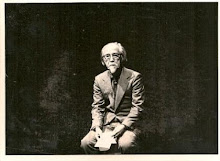Asghar Farhadi’s fifth feature, A Separation (2011), is a naturalistic drama that seeks to tie the
microcosm of the family, the individual, and religious institutions with the
macrocosm of society at large. This is established in the opening scene as bands
of light, moving horizontally, illuminate the screen, making us privy to a
montage of documents being xeroxed. From birth certificates to passports and
other legal documents we get snippets of information that we can’t really
process, but prepares us for what we will watch. For the tenets of
commercial dramaturgy with its histrionics and contrived premises will not be
humored in this film. Farhadi instead slices away at the veneer of Iranian
society by way of a slice of life story.
Introducing our first main characters, Nader (Peyman Moaadi) and Simin (Leila Hatami), in a bare room, framed in a medium two-shot, and facing the camera the director deftly co-opts the documentary aesthetic to tell the story. This adherence to reality provokes the viewer to be subsumed by the narrative in a way that belies commercial storytelling. And what’s even more remarkable about this scene is that the director positioned Simin and Nader to be both spatially equal so that an audience would not sub-consciously perceive either one as being more important than the other.
Introducing our first main characters, Nader (Peyman Moaadi) and Simin (Leila Hatami), in a bare room, framed in a medium two-shot, and facing the camera the director deftly co-opts the documentary aesthetic to tell the story. This adherence to reality provokes the viewer to be subsumed by the narrative in a way that belies commercial storytelling. And what’s even more remarkable about this scene is that the director positioned Simin and Nader to be both spatially equal so that an audience would not sub-consciously perceive either one as being more important than the other.
This visual motif of having characters face the camera and
speak their lines continues throughout the picture, mainly during the interrogation scenes, and by doing this the audience takes on the role of not being just a passive viewer, but also a judge. Yet this role as judge does not mean that the story
and characters exist just for us to praise or condemn. Having had a successful
career in Iran as scriptwriter in both radio and television before stepping
into directing, Farhadi has a strong background in dramatic storytelling, and
“A Separation” showcases just how talented the man is in crafting not just a
well-structured plotline, but also characters that could live and breathe outside
of the picture’s 123-minute runtime.




